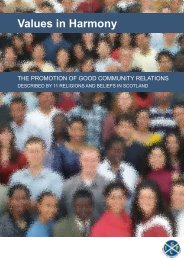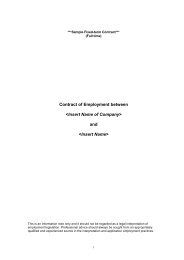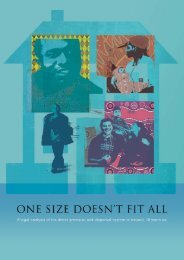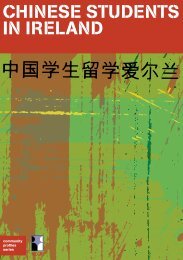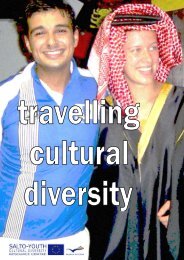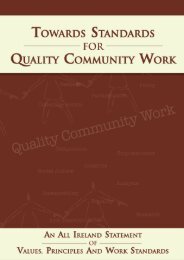Intercultural Education in the Post-Primary School - National Council ...
Intercultural Education in the Post-Primary School - National Council ...
Intercultural Education in the Post-Primary School - National Council ...
Create successful ePaper yourself
Turn your PDF publications into a flip-book with our unique Google optimized e-Paper software.
HUMAN RIGHTS AND RESPONSIBILITIESWe are all members of <strong>the</strong> human group. Asa consequence of our membership of thatgroup we all share certa<strong>in</strong> rights as well as<strong>the</strong> responsibility to protect those rights foreach o<strong>the</strong>r. It is important, when look<strong>in</strong>g at<strong>the</strong> th<strong>in</strong>gs that we share with o<strong>the</strong>r people,to work for a better understand<strong>in</strong>g ofhuman rights, what <strong>the</strong>y are, and how wecan make <strong>the</strong>m work <strong>in</strong> practice.While <strong>the</strong> Universal Declaration of HumanRights is <strong>the</strong> most broad-based descriptionof people’s rights, <strong>the</strong> Convention on <strong>the</strong>Rights of <strong>the</strong> Child (1989) is also a keystatement of rights relevant to pupils.The responsibility for enforc<strong>in</strong>g <strong>the</strong>se rightslies with each of us, <strong>in</strong>dividually. ThePreamble of <strong>the</strong> Universal Declaration ofHuman Rights states:… every <strong>in</strong>dividual … keep<strong>in</strong>g thisDeclaration constantly <strong>in</strong> m<strong>in</strong>d, shall striveby teach<strong>in</strong>g and education to promoterespect for <strong>the</strong>se rights and freedoms andby progressive measures, national and<strong>in</strong>ternational, to secure <strong>the</strong>ir universal andeffective recognition and observance.• Rights are universal. They apply <strong>in</strong> everycountry. Someth<strong>in</strong>g that is a humanright cannot be denied to a personsimply because <strong>the</strong>y are <strong>in</strong> one place orano<strong>the</strong>r.• Rights are <strong>in</strong>divisible. All rights are tobe recognised equally. This means thatuniversal social and economic rights like<strong>the</strong> right to medical care, choice of ajob, leisure time and necessary socialservices, are not more or less importantthat universal political rights, like <strong>the</strong>right to a fair trial.• Rights are <strong>in</strong>alienable. They cannot bedenied or taken away from people.There is a well-founded fear that develop<strong>in</strong>gan awareness of <strong>the</strong> needs of members somegroups <strong>in</strong> society may lead to a sense of <strong>the</strong>superiority of <strong>the</strong> dom<strong>in</strong>ant culture over <strong>the</strong>culture of o<strong>the</strong>r groups. There is, forexample, some evidence that images ofAfrica used to raise funds <strong>in</strong> Ireland for aidwork may have played a role <strong>in</strong> develop<strong>in</strong>ga sense of superiority towards Africansamong Irish children. The concept of rightsseeks to prevent <strong>the</strong> development of thissense of superiority, focus<strong>in</strong>g as it does on<strong>the</strong> rights and responsibilities of each of us.In this respect, rights are not simply an issuefor <strong>the</strong> needy or those discrim<strong>in</strong>ated aga<strong>in</strong>st:we each have rights and by virtue of hav<strong>in</strong>gthose rights we have a responsibility toprotect <strong>the</strong>m for each o<strong>the</strong>r.The recognition that responsibilities comewith rights is essential. If any group, <strong>the</strong>majority or an ethnic m<strong>in</strong>ority, is todemand of o<strong>the</strong>r people that <strong>the</strong>ir rightsare respected, members of that group have,<strong>in</strong> turn, a responsibility to protect and topromote <strong>the</strong> rights of o<strong>the</strong>r groups.Sometimes conflict can arise due to anapparent clash of rights. The ability to usesuch conflict constructively to producesolutions is related closely to <strong>the</strong> ability toapply <strong>the</strong> concept of rights andresponsibilities equally to everyone.Those who framed <strong>the</strong> UniversalDeclaration recognised that not allcountries would protect <strong>the</strong>se rights. S<strong>in</strong>ce<strong>the</strong>y recognised that <strong>the</strong> responsibility toprotect rights did not have borders, <strong>the</strong>yidentified that everyone would have <strong>the</strong>right to seek asylum should <strong>the</strong>ir ownhome country refuse to protect <strong>the</strong>ir rights.Human rights are one of <strong>the</strong> th<strong>in</strong>gs thatb<strong>in</strong>d us all toge<strong>the</strong>r. As such <strong>the</strong>y provide abasis for develop<strong>in</strong>g empathy betweenpeople. They also form a context with<strong>in</strong>which immigration and various forms ofdiscrim<strong>in</strong>ation can be understood withoutpromot<strong>in</strong>g ideas of cultural superiority.Younger children will beg<strong>in</strong> to develop anunderstand<strong>in</strong>g of fairness and unfairness56<strong>Intercultural</strong> <strong>Education</strong> <strong>in</strong> <strong>the</strong> <strong>Post</strong>-<strong>Primary</strong> <strong>School</strong>




